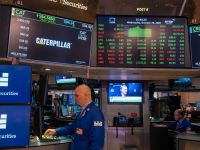If there is one theme for Gulf Co-operation Council (GCC) stock markets, it is the evaporation of liquidity. From a peak value traded at over $1.6 trillion in 2006, liquidity experienced annual declines of 40 percent in 2007, 2009 and 2010 and reached a low of $296 billion in 2010, only to recover to $335 billion in 2011, the first annual increase since 2006.
Such a drastic fall led to many brokerage houses closing.The relative halting of lending across the region has played a large part in declining liquidity on the exchanges. According to the Institute of International Finance, around 10 percent of bank lending goes towards purchasing securities, while 26 percent and 10 percent goes towards real estate and investment companies respectively - which are currently in a state of distress or low growth potential.
Loans growth across the GCC has decelerated sharply since 2009. Average annual loans growth between 2004 and 2008 was 29 percent, reaching a high of 38 percent in 2007. This has fallen to low single digits in the past two years; a flat one percent in 2009 and six percent in 2010. Loans growth has slowed for a variety of reasons, chief among them being heightened risk aversion among GCC banks as they work towards restoring health to their balance sheets and moving away from so-called “name lending”.
There has been a tightening of credit in general, but more specifically, banks have been reluctant to lend for the purpose of purchasing securities given current conditions. Moreover, there is a general de-leveraging among retail investors who are then unable to procure loans to invest in stock markets as easily as before. Absence of institutional investors is also contributing. Sovereign wealth funds and other investment institutions have evinced little interest in local markets due to perception of high risk as well as a fear of stoking liquidity in an already speculative market. Limits on foreign ownership are also a hindrance for attracting foreign capital, in addition to a tenuous regulatory framework across markets which also serves as a deterrent to foreign participation. Many retail investors, who make up the bulk of stock market participants, are going through their own state of de-leveraging following the global credit crisis and resulting fall-out.
The drying up of regional liquidity has had many effects on the GCC. These range from stock-specific - increasing Bid/Ask spreads - to broader effects like a decline in correlation between stock markets and oil prices, a worsening of the GCC’s external image as an investment destination and the weakening of the regional brokerage industry. From 2005 to date, crude oil and the S&P GCC Index have had a correlation of 39 percent, increasing to 44 percent between 2005 and 2008.
For the period following the start of the crisis, 2009 to date, the correlation drops to 22 percent as markets traded sideways while crude oil rose. Correlation dipped into negative territory in 2011 as regional political unrest brought markets down while uncertainty and supply concerns from Libya caused oil prices to surge. We expect this correlation to pick up once credit lines loosen and banks begin lending, which may take another year or so given the pace with which debt issues are currently being resolved. Brokerage firms have suffered tremendously due to dwindling capital market activity and volumes, which dent fee income and profitability for firms like Shuaa Capital and EFG-Hermes.
According to Reuters, investment banking fees fell 35 percent in the first nine months of 2011 to $317 million. Encouraging the development of a regional derivatives market would help support and raise liquidity levels by providing additional options and instruments, which in turn would allow for more diverse and sophisticated product offerings. Given that the majority of investors in the region are retail - currently in an illiquid or deleveraging state - an increase in institutional investor support would go a long way towards increasing market liquidity. Regulatory progress and development is seen as vital to restoring GCC markets, bringing credibility and enhanced foreign investor interest.
Qatar has been actively attempting to raise Foreign Investor Limits, mainly to satisfy MSCI [Morgan Stanley Capital International] requirements for upgrade to emerging market status, but the move will make the market more attractive to foreigners in general. Furthermore, the Kuwait Capital Market Authority was established with its regulations and bylaws governing the exchange and investment companies.








